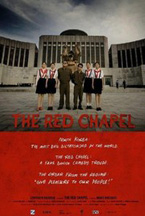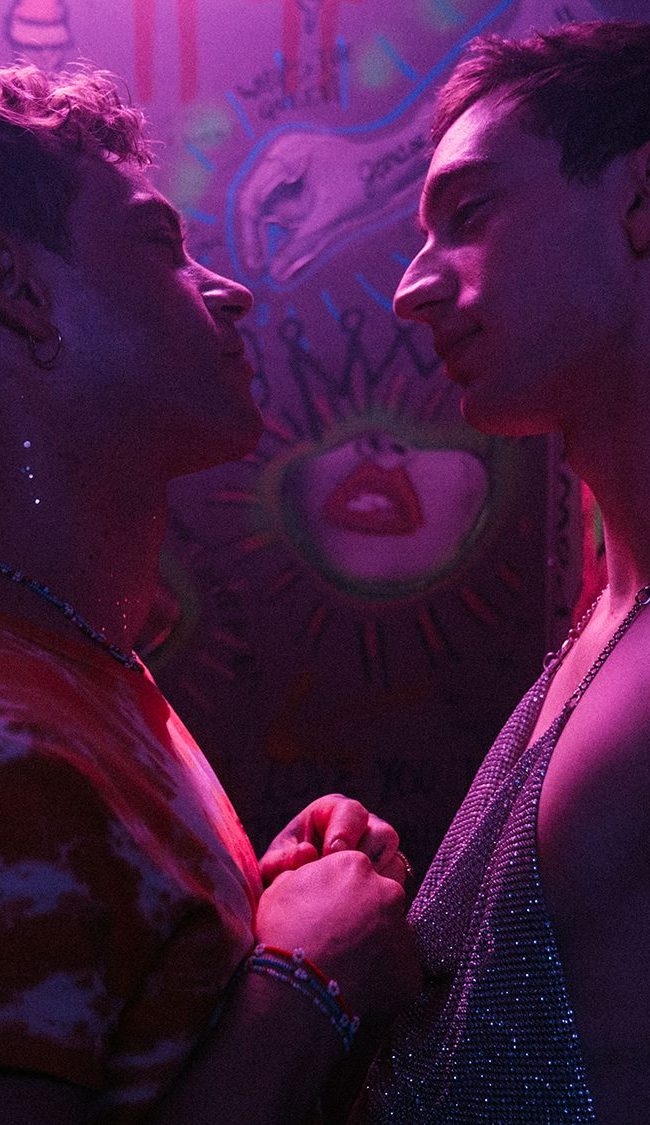
(The Red Chapel was picked up for distribution by Lorber Films. It opens theatrically at the IFC Center on Wednesday, December 29, 2010. Visit the film’s official website to learn more. Note: This review was first published in conjunction with the film’s appearance at the 2010 Sundance Film Festival.)
In Mads Brügger’s The Red Chapel, we get a rare glimpse of the dystopic urban nightmare that is Pyongyang, North Korea. The film has gone out into the world as a Danish film, but it is very much a North Korean one as well, a chilling and fascinating glimpse of that clandestine place. And, what at first seems like a Python-esque charade played just for laughs, manages to provide plenty of fiercely sobering moments due mostly to a brilliant script masterminded by its director, a star journalist and personality in his native Denmark.
The Red Chapel’s shorthand log line, if it needed one, would probably be something along the lines of “The Yes Men do North Korea.” (Take a look at part of it here.) For its US premiere, it will screen as part of Sundance’s World Cinema Documentary Competition. The aptly named director Mads Brügger’s wild adventure takes us into the maw of Kim Jong-Il’s secret empire. How these Danes got permission is anyone’s guess, but we’ll chalk it up to kismet since this filmmaker does not squander a moment of his time there to explore and extrapolate upon the nature of this country that has cut its population off from the rest of the world while eating hundreds of thousands of its own through mind control, starvation, torture and life-long imprisonment. In other countries, one can be labeled a dissident and still go home and have dinner with the kids. Not in the Democratic People’s Republic of Korea. One can be “disappeared” permanently. Enough of what goes on there has been leaked out over the decades to know that to not only get in there, but to get in there with cameras, is an impressive feat, indeed.
The chilling brilliance of The Red Chapel shows itself in its leadership on both sides of the fence. On the official site of Denmark, there is an essay on the personality of the Danes by journalist Victor Andersen that says, “Common to all Danes is their tendency to take the ups and downs of life with a touch of irony, often self-irony. . . . They tend to say the opposite of what they think, in keeping with the nature of [that] irony.” In other words, they could turn out to make great spies and get away with a hell of a lot in a place that doesn’t know what irony is.
 However, it also says that, “There have also been traces of local insularity, snobbery and conformity. It was best not to be different or odd.” So a Dane might feel a certain empathy with the North Koreans, perhaps, who are conformists par excellence? Brügger brings some friends with him on this journey, namely, two young Korean comedians, both raised from a young age in Denmark; they consider themselves Danish, not Korean. They are there to stage a comedy revue for a select audience in the capitol city and that is their guise for being there in the first place. One is a big strapping, tattooed young lad called Simon, the other an 18-year-old spastic with a severe central nervous system disorder which affects his physical movements and speech, making most people think that he’s retarded when he’s far from mentally deficient. This boy called Jacob finds himself in a place where children like him are given away or hidden from the rest of society, or as is intimated more than once, done away with completely.
However, it also says that, “There have also been traces of local insularity, snobbery and conformity. It was best not to be different or odd.” So a Dane might feel a certain empathy with the North Koreans, perhaps, who are conformists par excellence? Brügger brings some friends with him on this journey, namely, two young Korean comedians, both raised from a young age in Denmark; they consider themselves Danish, not Korean. They are there to stage a comedy revue for a select audience in the capitol city and that is their guise for being there in the first place. One is a big strapping, tattooed young lad called Simon, the other an 18-year-old spastic with a severe central nervous system disorder which affects his physical movements and speech, making most people think that he’s retarded when he’s far from mentally deficient. This boy called Jacob finds himself in a place where children like him are given away or hidden from the rest of society, or as is intimated more than once, done away with completely.
He is the deepest thinker, the most intensely emotional, most adversely affected subject in this whole shebang, incessantly articulating why following an ironical conformist into a conformist society with no irony can be a bloody dangerous thing. And so young Jacob turns out to be the steadfast baseline of this particular (oddly-shaped) triangle. The triangle is fast becoming my favorite geometrical shape; when something is “triangulated,” both the fixed baseline, as well as the angles that radiate from it, form a pretty damned accurate survey of certain systems and relationships. While Brügger is unscrupulously giving the North Koreans a run for their money, Jacob is questioning the evil nature of his own leader, the man who brought him there to help perpetrate a fraud on a grand scale. This is not a highly nuanced film for the most part; it is broad and slapstick in nature, delivering punch after comedic punch while exposing the underlying disease of an oppressed people.
To Brügger, who constantly compares current-day North Korea with Hitler’s reign (the title references a communist spy cell that operated in Nazi Germany), the mad clapping and smiling and crying and puppeteering that go on like a mass case of Tourette’s amongst its citizens connotes sheer terror, a terror these people live with day in, day out with no respite since everyone is watching everyone else for the slightest sign of unrest or unacceptable actions and thoughts. His earnest wish that the local people accompany Simon singing the Oasis song “Wonderwall” is his own idea of not-so-subtle thought control:
“And all the roads we have to walk are winding / And all the lights that lead us there are blinding / There are many things that I would like to say to you / But I don’t know how. Because maybe / You’re gonna be the one that saves me / And after all / You’re my wonderwall.”
Like The Yes Men and others like them, Brügger is a ferocious cultural insurgent, the camera his most potent weapon. His film will force you to double over with belly laughs. It will also chill you to the bone.
— Pamela Cohn












Pingback: AMBASSADOR, THE – Hammer to Nail